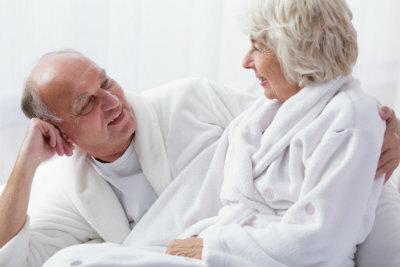Seniors and Sexuality


Seniors and Sexuality
While the media is known for portraying sex as something meant for only the young and beautiful, more and more seniors are finding a gratifying sex life is attainable and enjoyable at any age.
Seniors who frequently engage in sexual activity enjoy the benefits of boosted immunity, lower blood pressure, pain relief, and better sleep. Through these intimate encounters seniors strengthen the physical and emotional connection with another person, combating feelings of isolation, depression, and loneliness. Sex can also enhance one’s mood, self-confidence, and overall health. Seniors who engage in sexual activity regularly tend to be happier, healthier, and more satisfied with life

For many, sex gets better with age and experience. In the latter years of life, we tend to become more patient and attentive to our partner’s needs. Additionally, by this stage in life most people have learned what brings them the most pleasure, and are more inclined to share this information with their partners.
Another great benefit of having intercourse after menopause is that there is no need to worry about an unwanted pregnancy; however, sexually transmitted diseases (STDs) pose a risk to all who engage in sexual activity, no matter their age. The Centers for Disease Control reports only 6% of adults over the age of 61 use condoms in sexual encounters. STDs are often left undiagnosed in aging adults and can complicate pre-existing medical conditions. In order to prevent the spread of these dangerous diseases, seniors should always practice safe sex.
While sex can be pleasurable and beneficial at any age, seniors may experience many physical changes and medical issues that make it more difficult. Changing hormone levels, illness, chronic pain, and disability can greatly affect a senior’s satisfaction and performance in the bedroom. Additionally, drugs, alcohol, and some prescribed medications can lead to sexual problems such as decreased libido, erectile issues, and delayed orgasms. Feelings of depression, anxiety, stress, and insecurity may also affect one’s ability to perform sexually.
"Seniors should feel comfortable discussing their sex life with their healthcare providers." says Dr. Noah Marco, chief medical officer of the Jewish Home. "Senior sex is natural and healthy, and most doctors are comfortable and experienced with helping their patients maintain an active sex life. Clinicians can diagnose and treat STDs with simple exams and tests. Doctors can also suggest ways to improve one’s sexual experience, and prevent sex-related injuries and accidents. Because of physical changes caused by aging and some diseases, seniors (both men and women) will often need to be prescribed medication in order to have intercourse. Remember, your healthcare provider’s goal is to help you maintain all the things that you enjoy doing so don’t be hesitant if one of the things that you need help with is your sex life."